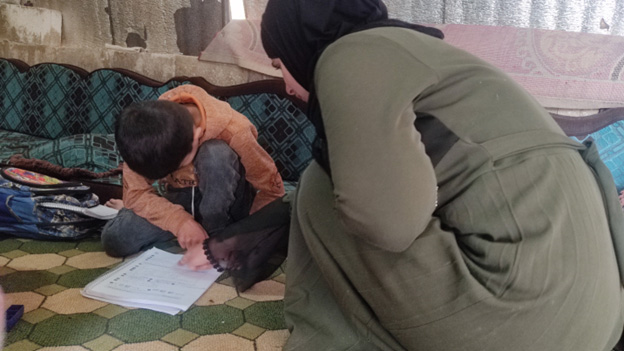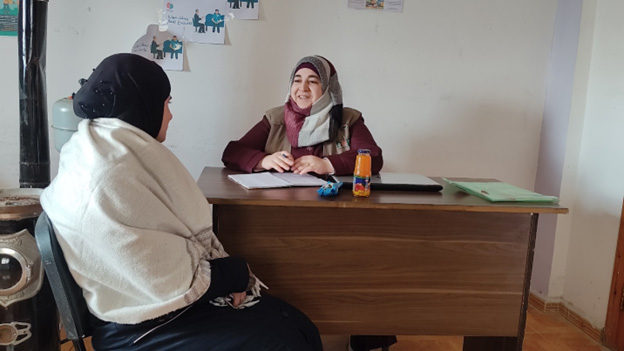3 January 2024 – “After years of suffering, I am finally feeling empowered to regain control over my own destiny,” shared Hana, aged 29 years, who has suffered a series of devastating losses.
A decade ago, Hana was forced to flee her home when fighting intensified close to her village in northwest Syria. She left her relatives without saying goodbye, uncertain if she would ever see them again.
Having taken shelter at Sundian camp in Idlib governorate, Hana, her husband and 3 children struggled to make ends meet. The hardships endured in the camp took a serious toll on Hana’s mental health.
More than 12 years of conflict, displacement, lack of livelihoods and dire living conditions, combined with the February 2023 earthquakes, have been detrimental to the mental health of many people in northwest Syria.
WHO estimates that nearly 1 million people in northwest Syria suffer from a mental health disorder – of which 230 000 people suffer from a severe mental health disorder.
Ongoing cycle of loss
When 7 months pregnant with her fifth child, Hana suffered a miscarriage. The loss haunted Hana and she was left feeling overwhelmed by fear and anxiety.
Six months later, when the devastating earthquakes struck northwest Syria and Türkiye, Hana tragically lost her sister and the sister’s 4 children.
Hana felt trapped in a cycle of loss. She lost her appetite and more than 28 kg in weight and was no longer able to care for her children.
A recovery plan for Hana
Hana’s husband Ahmed saw her mental and physical health decline and was eager to help. He joined an awareness-raising session on mental health and psychosocial support run by Hope Revival Organization, a WHO partner. On learning of the services available, Ahmed went with Hana to the mental health clinic in the camp.
Hana had a series of psychosocial assessments and was prescribed medications and given a recovery plan. This plan included 8 therapy sessions with a psychologist to explore Hana’s emotions, thoughts and behaviours.
 Hana helps her youngest son with his homework at Sundian camp, Idlib governorate. Following the successful completion of her treatment, Hana has been able to re-engage in caring for her children. Photo credit: WHO/ Hope Revival Organization Remarkable changes were soon observed in Hana. She regained her ability to care for her children and reconnected with her extended family. Her eating habits improved, and her mood stabilized.
Hana helps her youngest son with his homework at Sundian camp, Idlib governorate. Following the successful completion of her treatment, Hana has been able to re-engage in caring for her children. Photo credit: WHO/ Hope Revival Organization Remarkable changes were soon observed in Hana. She regained her ability to care for her children and reconnected with her extended family. Her eating habits improved, and her mood stabilized.
“Mental health services are an absolute necessity given the harsh living conditions in these camps,” said Hana’s psychologist. “The mental health services we provide to Hana and so many others equip them with the skills to manage stress, adopt new, positive thoughts and navigate their emotions.”
Seeing Hana’s progress, her mother also sought support at the mental health clinic.
“My journey has been challenging,” said Hana, “but with these services, it has ultimately led me to a place of joy and strength.”
The need to sustain and scale up support
Mental health care remains scarce in northwest Syria. Only 4 health facilities provide psychiatric services and just 2 psychiatrists serve a population of 4.5 million. WHO has been pivotal in supporting these facilities, through capacity-building, technical supervision and provision of psychotropic drugs and other medicines.
 Mental health clinics set up in camps for internally displaced people in northwest Syria provide psychosocial support and therapeutic interventions. Photo credit: WHO/ Hope Revival Organization In 2023, with generous funding from the Central Emergency Response Fund, WHO supported the provision of mental health services for internally displaced people and host communities in northwest Syria. It did so through existing mental health services in primary health care facilities and by setting up specialized mental health clinics and mental health psychosocial support mobile teams.
Mental health clinics set up in camps for internally displaced people in northwest Syria provide psychosocial support and therapeutic interventions. Photo credit: WHO/ Hope Revival Organization In 2023, with generous funding from the Central Emergency Response Fund, WHO supported the provision of mental health services for internally displaced people and host communities in northwest Syria. It did so through existing mental health services in primary health care facilities and by setting up specialized mental health clinics and mental health psychosocial support mobile teams.
Mental health clinics set up in camps consist of a resident mental health gap action doctor, 2 psychologists and 3 psychosocial workers. Each clinic serves as a hub for integrated services, offering individual consultations, psychoeducation sessions, and peer support. To extend the clinics’ reach, mobile teams run awareness-raising sessions and provide services in remote areas of northwest Syria.
In addition, the Mental Health and Psychosocial Support Technical Working Group in northwest Syria led by WHO supports mental health and psychosocial assessments, service mappings and the integration of mental health services within primary and secondary health care facilities to ensure greater access to such services.




